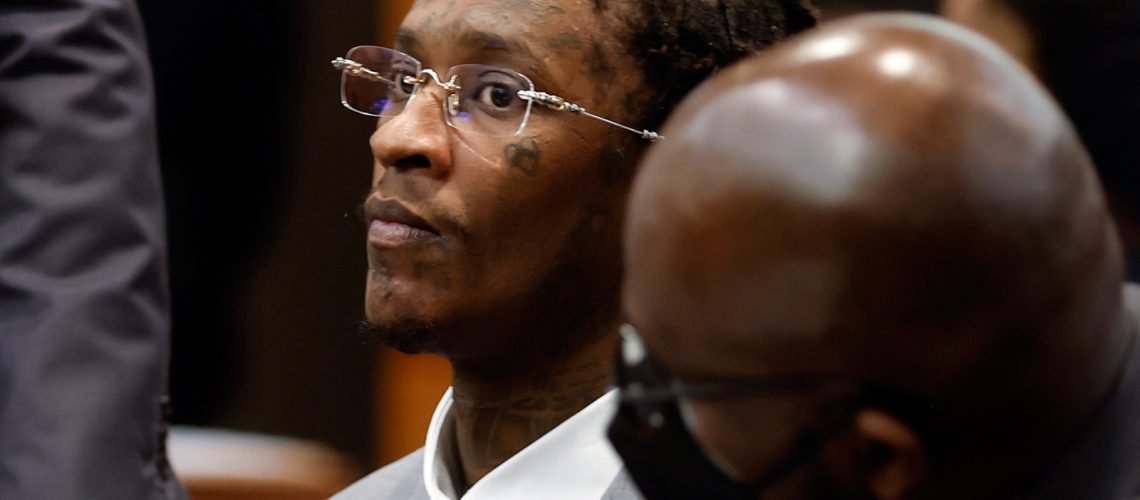Today marks one year since Young Thug, Gunna, and 26 others were charged in a 56-count indictment in Atlanta. Fulton County Defense Attorney Fani Willis alleges that Thug, real name Jeffery Williams, is the leader of Young Slime Life, which she claims is a criminal street gang. Williams, who has denied all allegations, has been incarcerated since May 9th, 2022, when Fulton County Police arrested him at his Atlanta home. He’s filed for bond on four separate occasions, with his last attempt on April 26th, but he’s been denied three times because of presiding judge Ural Glanville’s belief that he’s a danger to the community.
But that perception is in part fueled by Williams’ rap lyrics, a first amendment qualm that highlights the justice system’s racial inequities. Critics have decried that Williams and his codefendants are being denied their presumption of innocence while sitting for so long awaiting trial. But it’s not just Williams facing this plight; the carceral state’s inherent racial bias hinders all Black and Brown defendants from truly being seen as innocent until proving guilty, allowing prosecutors to restrict their freedom and rights before their case is even tried. In Georgia and elsewhere, citizens are overpoliced, and jails are overcrowded, creating legal logjams that keep innocent incarcerated as if they were already convicted.
In October of 2022, Willis filed a motion seeking to push back the start date of the trial from Jan. 9th to March 27th because they reportedly had over three terabytes of data in discovery to cull through. When Glanville denied their motion, he proclaimed, “Most of these people have no bonds. That is something that weighs heavily on the court in terms of a start date for this trial. They deserve to have a right to go to trial.”
Jury selection started on Jan. 4 and has moved at a glacial pace because of the travails of finding 12 jurors able to clear their schedule for what Glanville expects to be a six-to-nine-month trial. Over 1,200 jurors are expected to be summoned by May 19 —- and more could be called if they don’t find 12 people within that throng.
Editor’s picks
Lawyer and former federal prosecutor Neama Rahmani says that the sluggish jury selection is also a result of the sprawling nature of the case, with 14 defendants being tried simultaneously. “The issue, in this case, is the judge wants to try all the cases together. So you’re talking about more than a dozen defendants [who] all have a right to their own lawyer,” he says. “They all have a right to question each potential juror or each witness. So something that might normally take minutes might take hours [with] a dozen lawyers asking potential jurors and witnesses questions.”
Rahmani also said that the case’s notoriety is hampering jury selection, “This is probably one of the biggest trials ever to happen in Atlanta. It’s up there with the big, high-profile civil rights cases that have happened. So you’re going to be pressed to find jurors that don’t have preconceived notions.”
Jury selection is expected to go all the way into August, which would make 15 months in jail for Williams and the 13 other trial-standing defendants. Along with the YSL case, Willis is still investigating Donald Trump for potential racketeering charges in relation to the 2020 election. Rahmani says taking on two such high-profile cases is undoubtedly expending resources from an already depleted Fulton County Prosecutor’s Office.
“Fani Willis is investigating Trump. That would be the most politically-charged prosecution in American history if she charges him with conspiring to overfill the election. So the practical reality is that it’s going to take away from other cases.” He adds, “I was a drug and human trafficking prosecutor, so I was focused on the drug cartels. I wasn’t going to prosecute weed cases or just street dealers. It just didn’t make sense.”
Bridgette Simpson is an abolitionist and co-founder of the Atlanta-based nonprofit Barred Business, which assists incarcerated people with housing, legal protection, and other resources formerly to aid their re-entry into society. She tells Rolling Stone that the case “shows how often Black people are denied their due process in court based off of whatever theory that the prosecutors or the court system may have.” Simpson adds that “there’s so much overcrowding [in Atlanta jails] because they sentence poorly, they arrest poorly, and they don’t move through the court dockets at all. And it’s reflected in all of the cases that you see in the news, in all of the people that are laying on floors and sleeping on concrete to wait for a trial date.”
Related
Last September, 35-year-old Lashawn Thompson was found dead in a Fulton County jail cell, eaten alive by bed bugs. The cell was so unsanitary that a jail employee put on a HAZMAT suit before entering it.
Simpson says that the inhumane conditions are a symptom of overcrowding and that she and other organizers have been attempting to shift legislation around cash bail but keep running into roadblocks such as the recently vetoed Senate Bill 63, which vied to prohibit signature bond for misdemeanors such as shoplifting and marijuana possession. She says bail bondsmen and others who profit from the costly legal process have no incentive to act. “So they continue to lobby, they keep fighting back and forth in order to end [cash bail]. As far as pushing forward with statewide legislation, we’re still in the process of it, [but lawmakers feel like] ‘why invest in a solution when the problem plays?’”
The sprawling indictments against Williams and his fellow defendants include Racketeer Influenced and Corrupt Organizations (“RICO”) charges originally created to ensnare the Italian-American Mafia. But in New York, alleged mobster Ralph DiMatteo was given bail last year while awaiting federal RICO charges. In April 2021, Williams and Gunna, real name Sergio Kitchens, posted bail for 30 people who couldn’t afford to post their own bail but weren’t able to get their own bond approved (Kitchens is free after being sentenced to time served). Rahmani says that granting a defendant bond can be detrimental to a prosecutor’s efforts.
“If you’re a prosecutor, you want to keep defendants in custody without bond,” he says. “Obviously, any defendant, if they’re out, there’s potential that they commit other crimes. [Also], it’s very difficult to get someone to plead guilty and voluntarily go to prison when they’re out enjoying their freedom. You’re much more likely to convince someone to plead when they’re already in custody. So that’s a strategic reason why prosecutors like to keep people in custody.
It also makes it harder for the defendant to defend a case. When they’re out, they can fully meet with their lawyer and come and go as they please. But if they’re in custody, then the lawyer needs to go into the jail to meet with the defendant. It makes it harder for the defense to prepare for trial. So that’s the strategic reason why prosecutors like to keep defendants in custody.”
Holding defendants in jail can be a smart stratagem for a prosecutor, but it also means exposing someone innocent until proven guilty to harsh conditions. Last May, Williams’ lawyer Brian Steel explained his treatment in Fulton County Jail: “solitary confinement/total isolation,” a “windowless cement compartment with only a bed and a toilet and an overhead light which remains on 24 hours per day, preventing any sleep, rest or meditation,” “no access to any type of media,” and no ability to “exercise, shower or have human contact” aside from attorneys. In Brian Steel’s April bond motion, he said that Williams is sleep-deprived at Fulton County jail, which is affecting his ability to prepare for trial.
Jury selection continues in the YSL case, with the trial expected to begin sometime this summer. At that point, Williams and other defendants may have been incarcerated for over 15 months. Williams, a platinum-selling rapper, is contending with a more complicated set of bond factors than the average defendant. The racially motivated stigma against rap has hindered his presumption of innocence. Wililams’ lyrics were used as evidence in the indictment and read aloud by prosecutors, framing them as proof of his guilt.
Simpson contends that the torrential media coverage of the YSL trial is also making it difficult to find sufficiently unbiased jurors. Willis has previously said that the alleged YSL vs. YFN feud “created violence like Atlanta has never seen” and alleged that the 28 defendants charged “really do havoc in our community.” “[Potential] jurors are not going to be shielded from all that’s going on,” she says. “So how are you going to find a jury when you have a judge that’s on TV saying [Williams is] a threat to society? You’re condemning him guilty already. What jury of his peers are you going to find if you’ve already painted the message?”
Trending
Simpson and her Barred Business colleague Chartisia Griffin feel that prosecutors are amplifying the notion that Williams is a gang leader but not fully considering the good he’s done in Atlanta. Griffin describes Williams as “a healer in the community” who helped change the lives of numerous young people in Atlanta by not just encouraging them to leave the streets but giving them the means to do so.
“He’s paid young boys I know personally [where] he’s like, ‘Hey, no, no, no. Come out the street, man. What you think you going to make today? I’m going to give you that amount of money today to go get in the studio and record because you talented,’” She adds. “It was the power and the [positive] influence that he had that was fearful and the things that he was now promoting…’Could I get you to graduate? Could I get you to stay out of the street so we can vote?’ That’s why I feel so bad for his family.”




